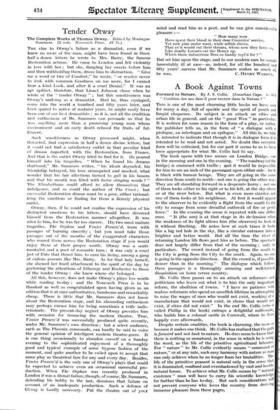A Book Against Towns
Tins is one of the most charming little books we have seen for many a day, full of sparkle and the spirit of youth and limpid eloquence. Its subject is an attack on cities and urban life in general, and on the "great Wen" in particular. It is written for some reason in the form of a play, or rather, the publisher tells us, in the form of "a dialogue with a prologue, an interlogue and an epilogue." All this is, we take it, intended to indicate that though it is in dialogue form it is intended to be read and not acted. No doubt this eccentric form will be criticized, but for our part it seems to us to have been appropriate for what Mr. Collis had to say.
The book opens with two scenes on London Bridge, one in the morning and one in the evening. "The roadway (of the bridge) is crammed with traffic ; and it would be impossible for him to see an inch of the pavement upon either-side--for it is black with human beings. They are all going in the same direction from south to north—not one is going the other way. They are all stumbling forward in a desperate hurry : not one of them looks either to his right or to his left, at the sky above or at the river below. But what is even more sinister, not one of them looks at his neighbour. At first it would appear to the observer to be evidently a flight from the south to the city to escape from some dreadful outbreak of fire or pesti- lence." In the evening the scene is repeated with one differ- ence. "It (the sun) is at that stage in its deslension when the weakness of its light allows him (the observer) to look at it without flinching. He notes how at such times it looks like a big red hole in the sky, like a circular entrance into a brighter and better world. But all the time the river of returning London life flows past him as before. The spectacle does not largely differ from that of the morning ; only in particulars. The crowd instead of going from the south 1,1 the City is going from the City to the south. Again, no MC is going in the opposite-direction. But the crowd is, if possible, denser than in the morning." The dialogue which follow. these passages is a thoroughly amusing and well-turned disquisition on town versus country.
Mr. Collis then passes on to an attack on reformers and politicians who leave out what is to him the only important reform, the abolition of towns. "I have no patience with zealous reformers who spend an unselfish lifetime in attempting to raise the wages of men who would not exist, working at a manufacture that would not exist, in slums that would not
exist, if cities did not exist." In the end Mr. Collis (who is called. Phillip in the book) entraps a delightful millionaire, who builds him a colossal castle in Cornwall, where he lives happily ever afterwards.
Despite certain crudities, the book is charming, the more so because it makes one think. Mr. Collis has realized that the path
is forward and not back to nature. He does seem to know that there is nothing so unnatural, in the sense in which he is using the word, as the life of the primitive agricultural labourer.
For" nature " to Mr. Collis evidently means "command of nature," or at any rate, such easy harmony with nature as man can only achieve when he no longer fears her brutalities. The life of the primitive peasant is natural only in the sense that it is dominated, confined and overshadowed by vast and hostile natural forces. To achieve what Mr. Collis means by " natural existence" man will have to carry his scientific knowledge far further than he has to-day. But such considerations will not prevent everyone who loves the country from deriving immense pleasure from these pages.






























































 Previous page
Previous page